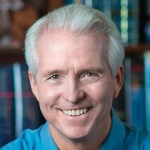As a young, soon-to-be ordained pastoral candidate, Eugene Peterson had clear expectations about what ministry would look like: “From fairly extensive reading about pastor and priest predecessors, I was impressed that everyday pastoral life was primarily concerned with developing a life of prayer among the people.” But ministry reality turned out to be quite different. “The first job description given me omitted prayer entirely. … I didn't like it and decided, after an interval of confused disorientation, that being a physician of souls took priority over running a church.” Peterson believed this new priority required devotion to the item left off his first job description: regular and fervent prayer for his church.
Another Pastor Eugene—Eugene Bradford, author of Intercessory Prayer: A ministerial task—highlights the same discord Peterson felt:
It is clearly a part of the minister’s task to give himself to prayer for his flock. In this age of activism, of programs and meetings and drives, it is easy to by-pass this activity which is to be performed largely in secret. But the ministers who neglect this function, together with their congregations, will pay a very high price.
How can those in ministry prioritize prayer for their congregations when so many other things demand their attention? How can they carve out time from the pressing responsibilities of running a church, and what should that time in prayer look like? We asked 10 pastors how they pray for their churches. As you read through their answers, you will find creative and practical strategies to help you focus on this essential ministry task.

Mandy Smith
Lead pastor of University Christian Church in Cincinnati, Ohio
One of the best ways I can pray for my church is to get myself out of the way. Every morning as I walk, I pray an emptying prayer, beginning with whatever is on my mind—however I’m obsessing, whoever I’m taking full responsibility for, all the ways I’m worrying. As I do, I feel myself rolling all of these concerns into a big ball, unearthing their tendrils from my heart and mind. Then I offer them up to God, sometimes with a physical action of handing something upwards. I say, “These are all yours. These people, these problems, these questions, this budget, this building, this neighborhood.”
And when I feel the weight lifted, I keep my hands open and say, “But whatever you want to delegate back to me, I’m ready. Show me the part of your work that is mine.” I look up at the sky and remember Matthew 6:22, recognizing how I’ve clenched my eyes shut in fear, opening my eyes with wonder to let in the light. There are times when God seems to hand something back to me. But usually I walk home lighter and more ready for however he’ll lead me in the day ahead.

Joshua Ryan Butler
Pastor of local and global outreach at Imago Dei Community in Portland, Oregon
In our digital age, church members often share struggles they’re facing via e-mail or text. I used to struggle with firing back “I’ll pray for you,” knowing I’d likely forget. So now I communicate my prayers to God for them via text or e-mail, similar to how I pray for someone on the spot when they share their situation in person.
This is a recent prayer for a family in our church who shared troubling news regarding their foster son via our Foster Parent Support Network e-mail list (names changed to protect identity):
Heavenly Father,
Our hearts are broken over Isaac's mental health, the failure of our broader city support systems, and the immense weight this has sent crashing like a sledgehammer into the Austin family. Almighty God, restore Isaac, exert your powerful right hand to move the pieces that need to be galvanized for Austin to receive the support he needs. We pray that the power of your Holy Spirit would heal and restore the chemical imbalances and mental challenges he's currently facing.
God of All Comfort, saturate the Austin family right now with your very presence. I pray that they would feel you close during this time and know the depths of comfort that go deeper than the oceans, and grant them a vision of the future that brings hope—not to avoid the despairing conditions of the present, but to give strength and endurance as they carry through it. Show us as their community how to support them right now; extend your mercy through their friends, family, and others so they would feel sovereignly cared for amidst the pain; and give them the courage if the time comes to reach out and ask for help.
Jesus, we thank you that you are no stranger to suffering or the pain of our world. We look to you as our Greatest Comfort and Friend in times of trouble. Carry them through this valley of the shadow, and bring Isaac and the Austin family to green pastures where they are cared for under the shelter of your affectionate gaze.
Amen.

Lee Eclov
Pastor at the Village Church of Lincolnshire north of Chicago and adjunct professor at Trinity Evangelical Divinity School
I envy pastors who pray well for their churches. I love my church, and I believe in prayer above all other ministry responsibilities, but it has never been easy for me. It is a mystery to me just what praying well for my church actually entails, but here’s what I do.
I keep a prayer list, though I don’t always use it. Sometimes I focus on just one or two matters. I pray for people or issues that haven’t even made it to the list. The church folks currently on my list include a couple teens, some folks who haven’t been to church for a long time, a handful of people going through especially deep waters, those I’m mentoring, and my “Guest List”—the people I’d like to invite to God’s Great Feast (in other words, unsaved friends).
I pray often during sermon preparation for myself and the church who will hear it.
I always have a half-dozen “Bigs”: a position we’re seeking to fill, a potential remodeling project, or some outreach efforts. I often pray out along the edges of the issue to try to find a way forward or to see how to pursue this thing on paths of righteousness. I weigh how I’m handling these issues inwardly, lest I harm my leaders or my church. Weaving prayer in and out of an issue spurs insight, creativity, and relational sensitivity.
Often the biggest help to me in praying for our church is to pray with others. A few years ago in a congregational meeting, I confessed my weakness in prayer. Afterward a man named Bill came up and said, “I want to help you with prayer. I will meet with you once a week to pray—anytime, anywhere.” I took him up on that. Now, whether Bill is in town or not, our staff meets to pray every week.

Jill Zook-Jones
Interim rector at St. Luke’s Episcopal Church in Columbia, South Carolina and co-author of Prayer: Discovering What Scripture Says
I’m a “pew walker.” Prayer walkers talk about the power of praying “on site with insight,” so several times a week when my church is empty, I go on a prayer walk down its center and side aisles. I begin my prayers with an adaptation of Psalm 51: Open our lips, O Lord, and our mouths shall proclaim your praise. Create in us clean hearts and renew a right spirit within us. Cast us not away from your presence and take not your Holy Spirit from us. Restore to us the joy of your salvation and sustain us with your bountiful Spirit. Then I put my hands on each pew and pray for the people who will sit there Sunday morning: for their awareness of the presence and power of Christ in their lives; for their physical, mental, and emotional health; for their relationships. And I pray that we will all come to recognize God’s vision for this church and be open to its realization through us.

Ken Shigematsu
Senior pastor of Tenth Church in Vancouver, British Columbia
As a pastor, I have taken to heart the words of the prophet Samuel who did not want to sin by failing to pray for his people (1 Sam. 12:23).
When someone from our community asks me to pray for them, I jot down their name and request on a small card—I now use my smart phone—and take time to pray their request on Saturday night.
On Tuesday, after my morning run, I get to the office before others arrive and stand in front of the staff in-out board and briefly pray for my (40 or so) colleagues. Our weekly staff report has a section where we can list our prayer requests, so this helps me pray for them specifically.
A few years ago, while reviewing a book on prayer by pastor and author Max Lucado, I was struck by his comment that the best thing he’s ever done as a pastor was to recruit 100 people to pray for him and his family every day. I follow his example: when I send regular prayer notes to members of our community, I also encourage them pray for specific needs of our church.

John Ortberg
Senior Pastor of Menlo Park Presbyterian Church in Menlo Park, California
From "Getting Good at Prayer Isn't the Point":
Several years ago a teacher who had a huge impact on my friends and me passed away. At his funeral, his son showed me the Greek New Testament where, decades ago, he'd written the name of myself, then my wife, then our three children to pray for us each week. It was profoundly moving.
So I started a similar list in the back of my (English) Bible. I have the names of numbers of leaders at our church—and their families—written down for each day of the week. There's something about the thought that I carry on the same tradition as Dr. Hawthorne that helps make this prayer moving for me.

Adam Weber
Lead pastor of Embrace Church in Souix Falls, South Dakota and author of Talking with God
I find myself consistently praying two specific prayers for the people at Embrace.
“Lord, help us fall more in love with you.”
More than just living a certain way, my prayer is that the church (myself included) would come to know God in a deep and intimate way. It’s the greatest commandment: to love God. So I pray that our passion and love for Jesus would grow daily, that we would hunger for God’s Word, and that we would learn to trust God in places where we’ve never trusted him before.
“Lord, please use us to tell others about you.”
God entrusted us with the greatest news that’s ever been told. I pray that our people will have a reaction similar to that of the woman at the well who, after meeting Jesus, told her whole town about the man she had met. So many people are hurting, and we get to tell them about the hope, joy, and purpose found in Jesus. That is the best news we could give them.

J. R. Briggs
Founder and cultural cultivator of The Renew Community in Lansdale, Pennsylvania
The specific points I pray for my church change with each season of ministry. In this current season, I am praying in four ways:
1. For deep hunger. Over 250 years ago, Nicholas von Zinzendorf challenged the Moravians to “fend off lukewarmness.” I’m praying for deep devotion and commitment to hunger after God, to know him more, and to grow to love God’s Word.
2. For joy in prayer. If prayer is drudgery we will find every excuse not to pray. But if we experience joy in prayer it will drive us to pray more. God has a track record of blessing and honoring a praying church.
3. For unity. As Paul challenged the church in Ephesus to make every effort to keep the unity of the Spirit through peace, I long for our church to comprehend that we are a part of one body and Spirit, called to one Lord, one faith, one baptism, and one God and Father.
4. That we would be pipes, not buckets. God has poured so much into us in his grace and mercy. I am praying that we wouldn’t keep this grace and mercy to ourselves, but that we would pour it out into others.

Jeremy McKeen
Founding and lead pastor of Truth Point Church in West Palm Beach, Florida
What should a pastor pray for their church? Well, for me it boils down to two central things: knowledge and power. Jesus taught that there are two reasons people drift into spiritual error: they don’t know the truth of God or they don’t know the power of God (Matt. 22:29). In the church world, we are tempted to emphasize one of these over the other. Some think that every problem is a lack of knowledge, while others think it’s always a lack of power. But Jesus teaches that both are important. This is why, in the book of Ephesians, Paul’s two prayers are for spiritual knowledge (Eph. 1) and for spiritual power (Eph. 3). You see the same thing in Colossians. Paul prays that the church would increase in the knowledge of God and be strengthened with all power (Col. 1:9–12). So while I usually pray a number of specific prayers for my church, most find their place under those two main requests: knowledge and power.

A. J. Swoboda
Pastor of Theophilus in Portland, Oregon and professor at Portland and Fuller Seminaries
I remember Eugene Peterson’s principled three-pronged approach his pastoral work: preaching, listening, and praying. The first two, I knew. But the third?
Over the years, Peterson has been proved right by his wisdom. I’ve come to long that I might become a pastor who takes the work of prayer as seriously as he does the call to preach, visit the sick, and evangelize. Like those words rolling off Samuel’s lips, I am learning it is a sin to neglect such a task: “As for me, far be it from me that I should sin against the Lord by failing to pray for you” (1 Sam. 12:23). This task was fulfilled by Jesus, who, as the great high priest, resolutely headed toward his cross by praying for his disciples and the church that is to be formed in his stead, empowered by the Spirit (John 17).
I am paid—on-the-clock, salaried—to pray. Those words of St. Benedict on the principle of prayer should guide our work: orare est labore. To labor is to pray. And to pray is to labor. I should be able to look at my billed hours as the pastor and say that the church got what they paid for:
Someone before the Father on their behalf.



















